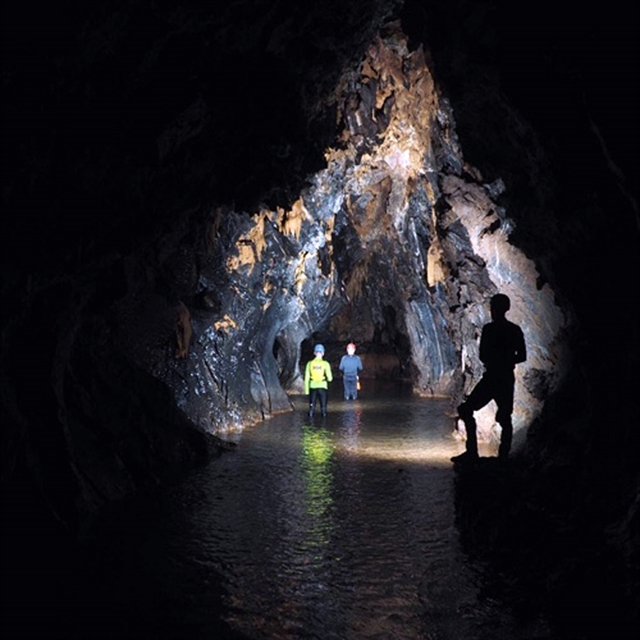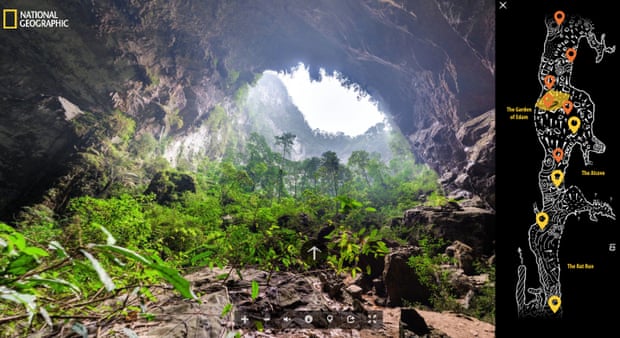 Life & Style
Life & Style

A group of 11 experts from the British Royal Caves Association (BCRA) have discovered 12 new caves in the central province of Quảng Bình, according to the provincial Department of Tourism.

|
| Scientists are entering a newly discovered cave in Quảng Bình Province. Photo baovanhoa.vn |
QUẢNG BÌNH — A group of 11 experts from the British Royal Caves Association (BCRA) have discovered 12 new caves in the central province of Quảng Bình, according to the provincial Department of Tourism.
After the majestic Sơn Đoòng Cave, the new caves cover a total length of over 10.4km and are located in different areas, announced the department. The new caves were found to have magnificent natural features and values.
These caves are spectacular and completely pristine, featuring underground river systems. Humans have never set foot in them, the department revealed in a report.
The BCRA experts said this year they conducted an expedition through Quảng Bình from 3rd to 20th of March.
They divided into two small groups, going deep into the primeval forest areas to survey the new caves.
Many areas in the four districts of Bố Trạch, Quảng Ninh and Minh Hóa have been targeted by the experts during their discovery trip.
The three caves found in Bố Trach District are named Doc Co with a total length of 554.6m, End Cave at 51.5m, and Dry Vom at 413m.
Four caves found in Quảng Ninh District are Nước Ngầm at 3,872m in length, Nước Lặn 3 at 1,919m, Hung Thoai at 460m and Coincidental Cave spanning 100m.
The other five were discovered in Minh Hóa District, namely Three Horned Viper at 194.8m, Phu Nhieu 4 at 2,012m, Cha Ra at 314m, Thoang Lip at 137m and Ma Lon at 463m.
Experts said stalactites in the newly discovered caves were formed in different shapes. They include those created by water flowing and due to mineral accumulation.
Howard Limbert, head of the BCRA group, said the cave system in the area was very large and that they only found 25 per cent of them.
The experts said during the years between 1990 and 2019, a team of scientists had discovered at least 35 caves.
For each cave, the scientists always set a GPS device for guidance and mapped out the cave based on accurate laser measurements.
The discovery of the 12 new caves will help boost tourism development in Quảng Bình Province in the future, a report from the Tourism Department said.
Quảng Bình is dubbed the "kingdom of caves" with hundreds of caves of various sizes as well as incredible mountain scenery and sprawling beaches.
The province is home to famous Sơn Đòong Cave, which was accredited as the world’s largest and most beautiful natural cave by the World Records Union and the World Records Association, as well as the UNESCO World Heritage Site Phong Nha – Kẻ Bàng National Park.
One of 10 best tours

|
| Part of the Sơn Đoòng Cave. Photo courtesy of National Geographic |
An adventure travel report by The Guardian issued on Monday listed Sơn Đoòng Cave as one of the 10 best virtual tours of the world's natural wonders, among others including the Grand Canyon of the USA, Mount Everest of Nepal, the northern lights, the Yosemite national park of the USA, the Zhāngjiājiè national forest park in China, the Giants Causeway of Northern Ireland, the Perito Moreno glacier of Argentinian Patagonia, the Ambrym volcano in Vanuatu and the Namib desert dunes in Namibia.
Sơn Đoòng Cave was discovered in 1991 by a local man, Hồ Khanh but was not located again until many years later. In 2009 it was explored by scientists for the first time.
The cave is strictly preserved by local people and authorities with help from the Government, domestic and international natural protection organisations.
Sơn Đoòng 360 is a project by National Geographic aiming to preserve the cave in digital form before it becomes subject to extensive tourism development, according to The Guardian.
A trek – created from 360-degree images and atmospheric sound effects – heads through light-filled caverns, passing a 70-metre-tall stalagmite called Hand of Dog, and huge sinkholes.
"Keep an eye out for members of the expedition crew and take advantage of the high- definition images to zoom into details of the cave’s geology, flora – and fauna, too, if you look hard enough," the Guardian reported. — VNS




